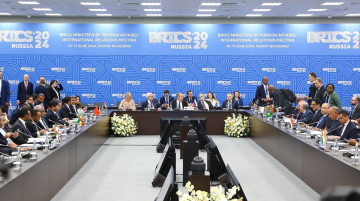
By Felix Brender 王哲謙
The BRICS bloc’s announcement to open its doors to new members has triggered considerable coverage and commentary suggesting the BRICS are setting themselves up to establish a new global order as an alternative to Western dominance, economic woes across BRICS and China in particular notwithstanding.
Fewer observers have opined on diverging baseline interests among existing members potentially derailing such endeavours (which remain poorly defined since extant BRICS members are yet to reach internal consensus) and have pointed to Xi’s absence from the G20 Summit hosted by India a mere fortnight ago, arguing that this might in no small part be a response to ongoing tensions between Beijing and New Delhi in what has been a strained relationship for a long time.
And yet, this doesn’t even begin to consider the powder keg that is the deep-rootedness of misgivings at the microgeopolitical level between China and India, the key drivers of BRICS. With the BRICS summit barely over, we were treated to an emblematic display of this mistrust on the Chinese internet earlier last week when Apple announced a partial shift of its iPhone production from China to India. False news of Indian-made iPhones purportedly failing EU safety tests spread across China’s microblogging service, Weibo, to be then picked up by usually more reliable sources.
This soon allowed Chinese netizens to rationalise their nationalist calls to identify and return presumably subpar Indian iPhones, or boycott iPhones altogether or even Apple more broadly, over what Chinese commentators describe as the company’s attempt at decoupling from Chinese production lines. The use of tainted racist language throughout, for instance in sources claiming Indian-made iPhones would be reeking of curry and using slurs to refer to Indians, is astounding and hardly indicative of the comradery or even friendship subverting the global system would necessitate.
This popular unbridled resentment of India exists against the backdrop of geopolitical ramifications of unaddressed border disputes between China and India: last weekend, India and China were at loggerheads over Beijing refusing visas to Indian athletes from Arunachal Pradesh — which Beijing claims as its very own territory of “South Tibet” 藏南 — hoping to attend the Hangzhou Asian Games.
Seeing this status quo among the two major BRICS countries in the bloc’s current state, it would take nothing short of a highly unlikely about-face in both Beijing and New Delhi to empower the bloc to make headway, not to mention equip it with the latitude to truly challenge the Washington consensus.
And even if political solutions were found at the international level, unfavourable and even hostile public opinion in the PRC would remain unaddressed and thus be an uncontrollable risk to Beijing’s BRICS aspirations. Until China and India soberly face this reality, BRICS enlargement to include regional powers is cosmetic at best: expanding the bloc won’t solve underlying issues. If anything, bringing more nations into the fold will make consensus ever more unlikely and downright impossible.
Felix Brender 王哲謙 is a PhD candidate at the London School of Economics & a Project Associate at LSE Ideas.








